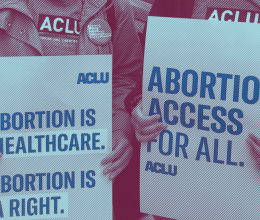
FOR IMMEDIATE RELEASE
CONTACT:
Robyn Shepherd, ACLU national, 212-519-7829 or 549-2666; [email protected]
Tom Hargis, ACLU of Texas, 832-291-4776; [email protected]
AUSTIN — Today two doctors filed suit against University General Hospital in Dallas after the hospital revoked the doctors’ admitting privileges because they provide abortions on their own time, off site. This is a clear violation of the law, which prohibits hospitals from discriminating against doctors because they provide abortions.
As a medical matter, doctors who provide abortions do not need admitting privileges because abortion is an extremely safe procedure and, in the extremely rare instance of an emergency, hospitals are already required to treat patients. But a new Texas law requires abortion providers – but no other type of doctor - to have admitting privileges at a local hospital. Major medical groups, including the American Medical Association and the American College of Obstetricians oppose admitting privileges because they do nothing to further patient safety. Rather, they harm women by cutting off access to safe, legal abortions.
Similar laws in Alabama, Wisconsin and Mississippi have been blocked by the courts.
“Discriminating against qualified doctors simply because they provide abortions not only violates the law, it also plays right into the hands of politicians who are laser focused on ending access to abortion,” said Jennifer Dalven, director of the ACLU Reproductive Freedom Project. “Major medical groups recognize that these laws don’t improve women’s safety. They’re designed to shut down clinics, plain and simple.”
“This law has nothing to do with women’s health. Politicians in Texas, not doctors, passed these laws to prevent women from getting abortions, and that’s exactly what has happened,” said Terri Burke, executive director of the ACLU of Texas. “Today women in large parts of the state are at greater risk because politicians have cut off access to safe, legal abortion care.”
The two physicians are represented by Debevoise & Plimpton LLP in this action.






